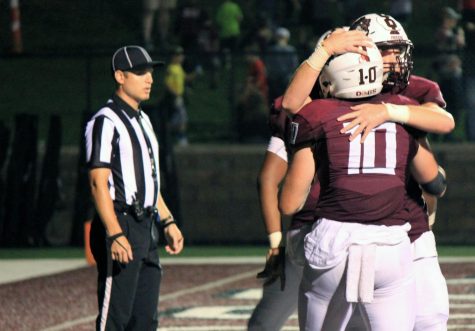A place to call home
Although High School is stressful in a million different ways, cliques, friends, GPAs, homework, sports most of us at least have the cushion of our parents providing for our basic needs. But what happens when they fail? For approximately 10,174 children in the state of Missouri alone, the answer to that question is foster care.
The foster care system is highly complex and very complicated for all involved. It is difficult to determine what is best for the sometimes troubled kids and how to determine whether or not the parents are fit enough to take back custody.
“Children wind up in foster care for a variety of reasons. Parents can no longer take care of them, parents pass away, drug related issues, parents going to jail, unsanitary conditions within the home, lack of supervision within the home, physical and emotional abuse,” foster parent Margaret Gray said.
The purpose of the foster parent is to provide a safe and stable home for the displaced children, many who have never had one before.
“You basically hope you plant a seed, a good seed for a child to grow and reflect back on throughout their life because they never have any stability so we try to give them some kind of stability and to know that life was different than what it was at their own home, that they can actually succeed and be somebody no matter what their family’s done you always have the support of your foster family. Even when you’re out of foster care, I mean we have kids who come back to us all the time, they’re not in foster care but they come back because we’ve been a positive influence in their life,” Margaret Gray said.
When fostering, the Grays’ philosophy is to try to treat the child as one of their own and provide them with the experience of what they think a family should be like.
“The thing about it is the kids don’t know how react with family because their family doesn’t do it. Mom and dad might go out and do what they want and the kids do what they want, so when they come to our house we treat them as family. We go to a ball game, everybody goes as one family. We even take them on vacation with us. We treat them just like family so when they go back they say ‘This is the way a family should be,’” foster parent Leonard Gray said.
Although all foster parents like to think of their home as a comforting space for the child, they recognize that in the ideal situation the children will return to their biological family.
“We had two little girls, one was a baby one was a four year old. The older one had been abused by mom’s girlfriend. The mom didn’t know, the mom worked evenings and the girls lived with us for approximately six months until mom got things straight and the boyfriend got arrested and it was really really nice to see that mom worked hard to get her children back. And a very surprising thing happened, we went to court and the judge granted mom the right to have her children back right away. Normally that happens within a week after the judge grants it. The children were granted the right to go home immediately right after court. And even though they got to go home, we are still their mom and dad. They still keep in contact with us, they still call us mom and dad. And they’ve done that for three years, we are still their mom and dad. They call if they have a special thing at school, you know ‘Mom and dad I need you to come to this program of mine,’ or ‘I need you to come to Thanksgiving dinner at school with me,’ I mean that’s what you want to see. We mentored their mom enough that she got she got her children back, and it’s a successful thing and we’re still involved with the girls’ lives,” Margaret Gray said.
As well as dealing with trials, family issues and having to become part of an entirely new family and home some foster children may also be unfairly judged by their peers for a situation that has nothing to do with them.
“When the school or the children find out that they’ve been placed in foster care, most people believe that the children have done something wrong. And the children haven’t done anything wrong. Most of the time it’s a family issue. Most of the time their family cannot appropriately take care of them, or are into drugs, or are unsafe for their children but the children always get the backlash of that like ‘Well you’re in foster care now. What did you do wrong?’ and it makes them feel bad. It makes them feel really bad. And then they get placed in a home where they know no one. They already get all this at school and then they go home where they don’t know anybody. And then the kids don’t know whether to call you by your name, mom and dad so they kind of get lost in the system,” Margaret Gray said.
The social life of a foster child is also affected as well as their home life. Foster children have a unique set of rules that they have to follow in regards of how their time is spent. Foster children must be under supervision at all times. They cannot simply go to a study date or to grab food after school because all activities must be supervised by the foster parent, and they cannot spend time at a friend’s house without a prior background check on their friend’s family. Foster children also have many rules regarding confidentiality. Children are not allowed to be on facebook so outside parties don’t know when the child is or is not within the state’s custody. They are also not allowed to tell their families where they to prevent their parents showing up at their foster home.
“Children have rules. Without the case workers previous acknowledgement they are not allowed cell phones and they are not allowed to talk to their biological family without supervision because of things that parents promise children that they cannot deliver. We had a placement where the mom and the dad would always say ‘You’re gonna be home in two weeks, you’re gonna be home in two weeks,’ they were within our home for fifteen months,” Margaret Gray said.
The many rules and regulations of the foster care system can be problematic for everyone involved. When working with such a volatile and sensitive topic a lot of gray areas are created about what may be best for each individual child, however the numerous rules can sometimes hurt more than help and result in the child getting “lost in the system.”
“There’s a lot of flaws in our system. We let kids fall through the cracks. Sometimes these kids, their needs are met but not met because there’s so much red tape, there’s so much paperwork, there’s so much going on that everything has to be a certain way, certain fit. And sometimes the kids end up being the ones that are thrown down from it. Sometimes the kids aren’t the ones that the needs are met for. Which is sad. We all have a lot of flaws. These kids they come into care because they have needs. They need something that we should be able to give them, that we as a society should be able to give them but in return we kind of get more worried about this is the way we’re supposed to do this, this is the way this is supposed to be done instead of meeting the kid’s needs, and that’s the biggest flaw in the foster care system,” foster parent Connie Moentmann said.
Although there are always rumors of foster parents trying to make money off of the foster care system, both Moentmann and the Grays stated that there is no money in foster care, and if the money given is spent on what it’s intended the parents will break even.
“You hear someone say ‘Well I’m gonna join foster care, because I can make a lot of money that way.’ No you can’t. I don’t know where they got that idea, because it’s not true,” Leonard Gray said.
Even though it’s almost impossible to make money off of foster care, unfortunately some foster parents still try. Foster children get a clothing allowance every six months, and some parents will use only a small amount for the foster child and the rest for their own children or personal use. Other families will take their biological and foster children out to dinner, but refuse to use their own money to buy the foster children food. Other abuses of the system are much more subtle, and may be as small as a parent joining not to help other people’s children, but in search of children to adopt for themselves. To combat all the previous negative influences in a child’s life foster parents have to first be open themselves to get a child to open up to them.
“[We have to] be ourselves. Be who we are. Bring them in as part of our family and not as if they’re some kind of outsiders. Any kid that comes into my home is part of us, and still will be when they leave. They’re still a part of us,” Moentmann said.
The Grays also believe that trust is essential in forming relationships with their foster children.
“[They open up] when they start feeling safe in the home, and trust you. That’s the biggest thing, is earning trust from the kids because they’ve already been dumped on by their parents or whoever and they need somebody to trust,” Leonard Gray said.
When a child begins to open up is when the rewards truly begin for foster parents.
“We can be sure if we plant a good seed, and that’s my world, I love to plant good seeds, that somewhere that seed is going to grow. It’s going to blossom out and become like a beautiful wildflower. That’s just how I see it, because kids are awesome when they’ve just been through a lot and suddenly they can just be who they really are. They can show their real side [and] the love that comes out of them,” Moentmann said.
Even if the rewards may not be immediate or evident, parents still hope that the good seed that they’ve planted may eventually surface.
“We had a boy, that we had off and on for three years. He was a very rebellious teenager that ran from our home when he turned 18. It kind of broke our hearts but then I saw him about 8 months later and he came up and hugged me and he said ‘Mom you know what? I did a dumb thing when I ran from your home. You were the best thing that happened to me. And I just want you to know that I love you and I appreciate everything that you’ve done for me and showing me the right way to go even though I’ve decided to chose a different path I still think of you and I still love you guys,’” Margaret Gray said.
While foster parenting is fulfilling, it can also be frustrating, and the frustration can quickly become heart wrenching when a child endangers themselves or is returned to a situation that is dangerous for them to be in.
“We had a little girl, about a year old that we had for almost a year. Her mom had been in the military [and the daughter] came to us with a cracked skull. Found out later that it was mom’s boyfriend that had done it, but they gave the little girl back to the family even though the abuse was still going on within the home. The day I had to give her up the mom’s boyfriend walked up and took her, and she was reaching out screaming ‘Mom, mom, don’t leave me, mom, mom, I don’t want to stay here.’ It breaks your heart, because you know that she’s going to get hurt again. And it was less than three weeks later that her and her mom moved into a battered women’s shelter. But since then, she has moved out of state with her family and they are all doing wonderful. But that’s heartbreaking when you know that they are going to be abused again, and the state gives them back,” Margaret Gray said.
Foster care can have some unexpected perks however. If a foster child who gets adopted wants to go to college there are a multitude of grants and scholarships that will be provided for them, as well as their medical costs being taken care of until they’re 25. The Grays have adopted two children, one at 16 and the other at age 2.
“My littlest one that we adopted, she told her preschool ‘I’m adopted. Do you want to know what adopted means? Out of all the kids in the world my mom and dad picked me and adopted me. So I’m special.’ That kind of hits you real close there, out of a four, five year old kid’s mouth. The rewards are worth it if you do it right. Not every kid’s going to walk up and thank you, but most of them will,” Leonard Gray said.
Both the Grays and Moentmann agree that the most important value that one can take away from foster parenting is to be supportive and fair to those around you.
“Treat everybody equal. It doesn’t matter if you’re in foster care, it doesn’t matter if you’re with your biological parents; we’re all human. And teenagers are all just teenagers. Who knows if that person just needs somebody to say ‘hey’, or just a smile, and it can brighten a day. I’ve had a lot of foster kids come through the high school and I personally would hope that people would treat them the same they would treat their friends that have biological parents because these kids are no different.,” Moentmann said.







